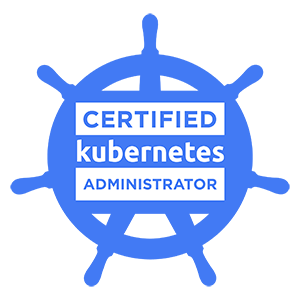
I’ve recently taken the CKA certification exam online after working for a few years with Kubernetes and just wanted to share a few tips for the veterans!
Tip 1 - Don’t be scared!
Do not be afraid. If you’ve been working with Kubernetes for a relatively long time, chances are that you’ll be able to breeze through the exam quite easily. I have been in the space for a few years now and I was confidently able to complete the exam with just a couple of days of preparation
Tip 2 - You should still prepare yourself
While the test for a veteran Kubernetes engineer won’t be too hard, you still want to make sure you work through your hands-on skill. The CKA test requires a lot of hands-on skill, so roughly knowing the Pod/Deployment/Statefulset/Daemnset spec will come in handy. I always have a hard time remembering the whole syntax for pod/node affinity!
Tip 3 - Get familiar with navigating the Kubernetes official documentation
This is probably the most crucial tip I can give you. The Kubernetes documentation is very powerful and it’s one of the sources you can freely use during the exam. That is how, even without remembering by heart how to write the pod affinity, I was able to still write it correctly when I was asked to.
Of course, I was very familiar with the concept, so the documentation is just a way to not lose time trying to remember what fields go where.
Tip 4 - kubectl explain
You might not know this, but kubectl has an explain command! This is very handy when you’re not entirely sure what values are accepted in certain fields and it can also be used to go through the tree of fields that are available in a Kubernetes object spec!
And while not inherent to the CKA exam, the kubectl explain command also works with Custom Resources and therefore is very useful when you don’t have the documentation page for that CRD readily available!
Tip 5 - killer.sh
As ominous as that name sounds, killer.sh is a CKA exam simulator that is a MUST to take if you want to increase your chances of passing the exam! It’s so good now that when you buy the CKA exam, 2 tries at the killer.sh simulation exams are included in the price and can be redeemed if you’re using your Linuxfoundation account to log in!
The exam is much more difficult and has more questions, so don’t feel down if you’re not able to complete it in the allocated time. If you can get 50-60% right, then you’re good to go!
Tip 6 - Relax
You’re bound to have an answer or two that you’re not sure about but you shouldn’t worry too much and just skip to the next one! You can always go back and review your answer before you submit them and remember that you can attempt the exam twice!
Tip 7 - Location, Location, Location
It is now much more common to take the exam at home now that we’re in a post-covid society. Be sure to follow all the guidelines as the proctor of the exam will ask you to turn your webcam around to check if there are any irregularities.
Make sure you’re in a quiet room and that no one will disturb you for the next 2-3 hours!
Tip 8 - Put aside enough time for the exam
While the time of the exam is roughly around 2 hours, you want to make sure you’re going to be disturbance-free for at least 3 hours in a room you know you won’t be interrupted. When I took the exam, I ended up starting 30 minutes later due to making sure my local setup for the exam was working fine and doing a tour of my room via my webcam
After the exam?
If you’re not a Kubernetes veteran already, now that you have the CKA you’re ready to work with Kubernetes! Otherwise, as a Kubernetes veteran, there are a couple of paths I would suggest to continue:
- Learn to create Kubernetes Controller and Admission/Mutating Webhook. They’ll greatly enhance your knowledge of how Kubernetes works internally. It’s a topic that is not covered during the CKA but I consider it to be a must to learn if you’re managing a Kubernetes platform.
- Start looking into the CKS certification. I haven’t done that yet myself, but I’ve been working in a very secure Kubernetes environment and one thing I can tell you for certain, you can go to great lengths in ensuring that Kubernetes is secure and it’s worth looking into it
I hope this article will be useful to you all, if so let me know!